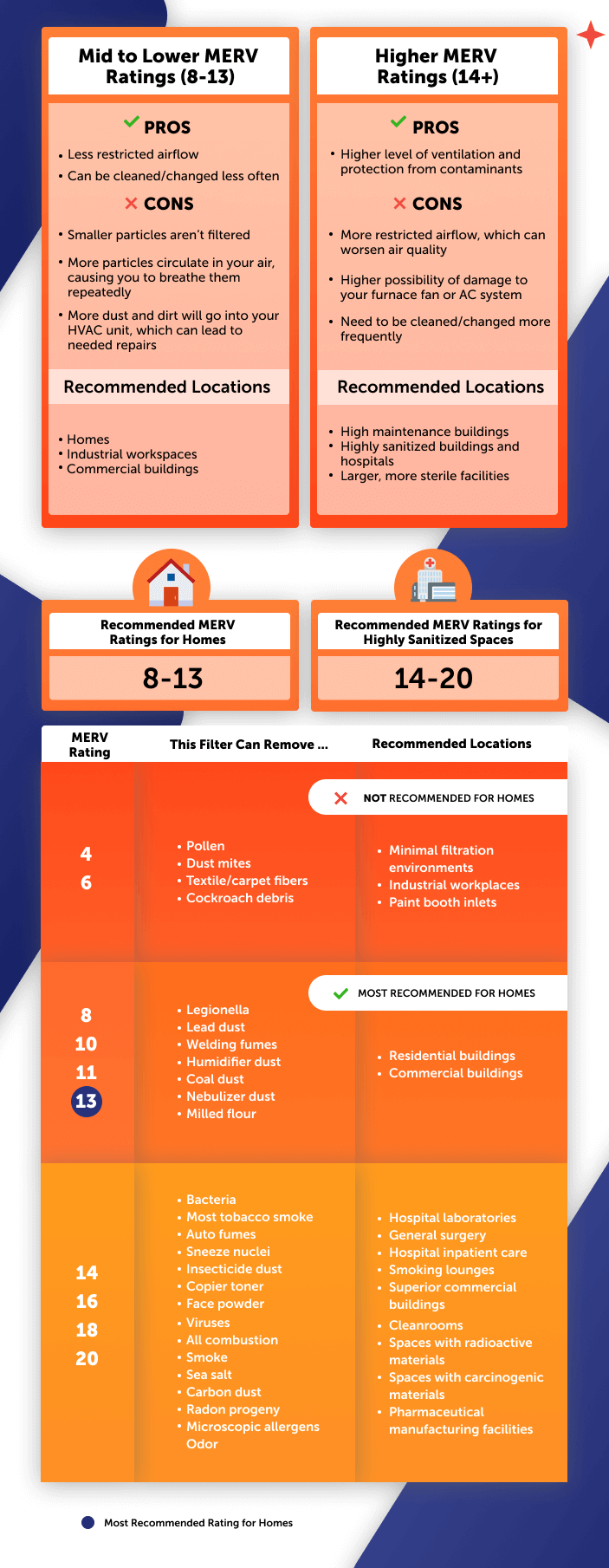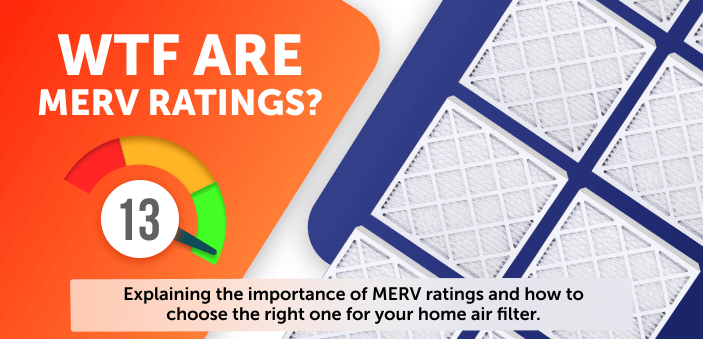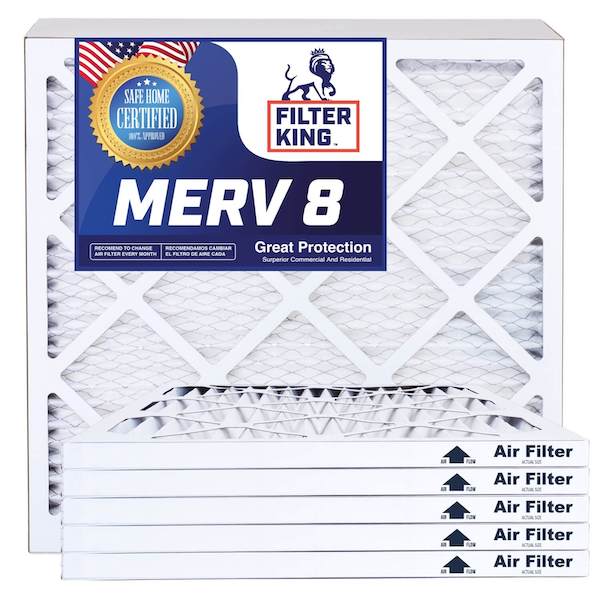Which MERV Rating Filter Should You Use in Your Home?
You may have noticed MERV filter ratings on various air filters but may be wondering what is a MERV rating on filters? This rating indicates how effective a filter is at capturing different sizes of particles. Read on to learn more about the MERV rating and how to choose the best one for your home.
What Is MERV Rating on Filters?
If you'd like to know what a MERV rating is, you're in the right place. MERV stands for Minimum Efficiency Reporting Value. In short, a MERV rating lets you know what air particle size an air filter will trap. A higher rating means that the filter can trap smaller air particles.
While you may automatically think that a higher MERV rating means a better air filter, that's not always the case. Higher MERV ratings aren't always necessary and can decrease your unit's efficiency. The best MERV rating will be the one that suits your needs and lets your unit run efficiently.
The History of MERV Rating
In 1987, the American Society of Heating, Refrigerating, and Air Conditioning Engineers designed the MERV rating scale to give a more accurate picture of an air filter's capabilities. Unlike other scales, which emphasized a need to increase the number of particles passing through an air filter, MERV was designed to offer a balance between particle filtering and energy efficiency.
The Importance of MERV Rating
A MERV rating is important because it helps you understand an air filter’s effectiveness so you can choose the right one for your particular needs. For example, if you have someone in your home who suffers from allergies, you may want a higher MERV rating.
The MERV scale also helps you balance your air quality and energy efficiency needs. The rating gives you the worst-case possibility for an air filter, so you can get a good idea of how it will perform. You can get by with a lower MERV rating and save money on your energy bill in some cases.

Understanding the MERV Rating Chart
Once you understand how the MERV rating chart works, you'll be able to choose air filters with the MERV ratings that are right for you. It's important to note that the MERV scale is an industry-standard. As such, you can use it to compare different brands of air filters.
The MERV rating chart is a numerical chart with values from one through 20. The highest MERV ranking means that an air filter will capture the most amount of dust, while the lowest rating means a filter will catch the least amount of dust.
The chart also uses percentages based on the chances of an air filter capturing dust particles based on the size of the microns. As the MERV rating goes up, a filter has higher chances of capturing smaller and smaller particles.
MERV Rating Levels
While the MERV chart covers 20 levels, these levels can be grouped to give you an idea of what a certain range of levels can capture and how effective each will be. If you're wondering what MERV rating should I use, this section can help you out.
MERV Rating 1-6
A MERV rating of 1-6 is the lowest range of MERV ratings, but that doesn't necessarily mean that you should write off a filter with a rating in this range. These types of filters do have their uses in certain situations. Most aluminum and mesh filters and cheap air filters fall within this range.
What It Can Remove
A filter with a MERV rating of between 1-6 can remove particles anywhere between 0.3 to 10 microns with an effectiveness of 20%. It can remove small particles such as dust mites, spray paint dust, carpet fibers, and pollen.
-
Pros
- Inexpensive and energy-efficient
- Not as taxing on your HVAC system
-
Cons
- Only filters out the largest of particles
- Not great for people with allergies or asthma
- Recommended Use: Industrial
These filters are best used in industrial settings where there is already a decent amount of airflow, and there isn't as much need to remove smaller particles.
MERV Rating 8-13
Filters with a MERV rating of 8-13 are usually higher-end filters for home use or high-quality commercial filters. These filters are typically the right choice for use in homes and many businesses.
What It Can Remove
A filter that falls within the 8-13 range can remove mold spores, lead dust, cooking dust, flour, hair spray, auto fumes, furniture polish, and welding fumes. They can catch anywhere from 20-85% of all particles.
-
Pros
- Suitable for people with allergies or asthma
- Blocks out a more extensive range of particles
-
Cons
- Somewhat costlier
- Not as energy-efficient
Recommended Use: Home
Filters in this range are the recommended MERV rating for furnace filters. They offer a mix of filtration and energy efficiency to keep your home safe while still cost-effective.
MERV Rating 14-20
Filters with the highest MERV rating of 14-20 include commercial, HEPA, and ULPA filters. These filters offer the highest level of filtration and are typically not needed in most homes and businesses.
What It Can Remove
These filters can remove smoke, bacteria, sneezes, carbon dust, and viruses. These are often removed at levels of 90% or better.
-
Pros
- Superior levels of filtration
- Can even protect from viruses and bacteria
-
Cons
- Expensive
- Not energy efficient
Recommended Use: Hospitals & Laboratories
Filters rated between 14-20 are typically only used in hospitals and laboratories, where air needs to be as clean as possible.
Other Ratings vs. MERV Rating
Other ratings include the MPR developed by 3M and FPR developed by Home Depot. These scales have different ranges than the MERV rating but typically measure against similar factors. MERV rating is superior because it's the international standard and makes it easier to compare filters from different brands.
MERV Rating Pro Tips
These MERV rating pro tips can help you make the best choices about which air filter you need.
Higher Is Not Always Better
A higher MERV rating isn't always better. While higher-rated filters can trap more particles, they can also put additional strain on your HVAC unit and cause your energy bill to go up. In most situations, a filter somewhere in the middle is more than sufficient.
Best Air Filter for Your Home
In general, the best MERV rating for a home is somewhere between 8-10. These filters will capture a large portion of the airborne particles and improve indoor air quality without making your energy costs rise significantly.
Do Not Max Out Your Filter
Neglecting to change your air filter can cause all sorts of issues. The biggest problem is that it causes your A/C to work overtime, which results in higher energy bills. Changing your air filter regularly keeps your unit working as it should.
Buy in Bulk and Save
You can save time and money by buying filters in bulk. The more filters you buy at once, the more you can save.
Order & Subscribe to Regular Delivery With Filter King
If you want to replace your air filter to be even more convenient, you can subscribe to our regular delivery service. You simply pick your air filter size, choose how often you want to replace it, and we'll make sure that your new filter is there when you need it.
100% Made in the USA
You know that you're getting the best of quality as all of our filters are made at our warehouse in Alabama. We pride ourselves on providing you with the best air filters.
Fast Shipping Guaranteed
Your order ships quickly, and shipping is always free. Our service guarantees that you have a new air filter when you need it.



 14x18x1
14x18x1
